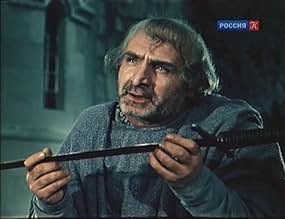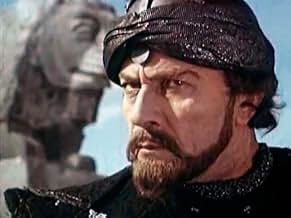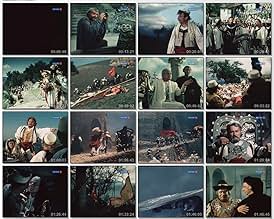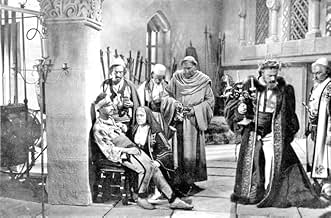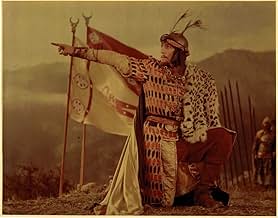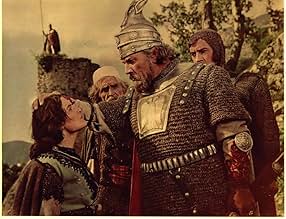Adicionar um enredo no seu idiomaThis is the true story of the National Hero of Albanians, George Kastrioti Scanderbeg, from his birth to his death. 1405-1468. Based mainly upon the monk writer Marin Barleti, the movie star... Ler tudoThis is the true story of the National Hero of Albanians, George Kastrioti Scanderbeg, from his birth to his death. 1405-1468. Based mainly upon the monk writer Marin Barleti, the movie starts off with how the boy Scanderbeg was taken hostage by the ottoman turks and trained from... Ler tudoThis is the true story of the National Hero of Albanians, George Kastrioti Scanderbeg, from his birth to his death. 1405-1468. Based mainly upon the monk writer Marin Barleti, the movie starts off with how the boy Scanderbeg was taken hostage by the ottoman turks and trained from them until he became one of the most outstanding warriors of the Ottoman Empire, then lat... Ler tudo
- Prêmios
- 2 vitórias e 1 indicação no total
- Dafina
- (as Veriko Andjaparidze)
Avaliações em destaque
Indeed, he was even revered by the militantly atheistical regime of the country's Communist dictator, Enver Hoxha. This film was made in 1953, during the Communist era, as a Soviet-Albanian coproduction, although the Soviet contribution was the greater, unsurprisingly given the small size of Albania and its economy. Most of the film was a shot in the Soviet Union by a Russian director, Sergei Yutkevich and it was made in Russian using Soviet (but not necessarily ethnically Russian) actors; Skanderbeg himself is played by a Georgian, Akaki Khorava. The film was then dubbed for showing in Albania; it was this Albanian-language version which I recently came across on YouTube.
As a child, the young George Kastrioti (Skanderbeg's real name) is sent as a hostage to the court of the Ottoman Sultan, where he raised as a Muslim and becomes a warrior in the Sultan's army. His love for his homeland, however, impels him to return to Albania where he puts himself at the head of the nationalist cause and leads his people in their struggle for freedom.
The film was recommended to me by our guide in Albania, who described it as the Communist bloc's answer to Western films such as "Spartacus" and "The 300 Spartans". In fact, both those films were made a few years after "The Great Warrior Skanderbeg", although in its grand visual style it has something in common with earlier Hollywood epics such as "Samson and Delilah" or "Quo Vadis?"
Although it was made during the Communist period, it is not notably Communist in its themes; there is, for example, no attempt to portray Skanderbeg as a proto-socialist. It is about patriotism and national struggles rather than about class struggles, with the Albanians (apart from a few pro-Turkish traitors) heroic and the Turks bloodthirsty villains. The way in which various other nationalities are portrayed, however, may owe something to Cold War rivalries. The villains, apart from the Turks, are the Serbs and the Venetians, shown as treacherous and unreliable allies of the Albanians, whereas their true friends are the Poles and Hungarians. In 1953, of course, Italy, like Turkey, was a member of NATO and Tito's Yugoslavia, although officially Communist, was despised by Hoxha's regime as "revisionist". Poland and Hungary, however, were Albania's allies in the Warsaw Pact. After Albania broke away from the Soviet Bloc in 1960, the film continued to be shown, but now it had a different meaning. Skanderbeg became a symbol of gallant little Albania standing alone against a hostile world.
Trying to evaluate the film is a difficult task for a non-Albanian. On the one hand, it is often grand and stirring. On the other, it can at times seem static and the acting does not always seem inspired, although this may be due to the fact that I was watching it in a dubbed version. I always, however, found it worth watching of the insights it affords into another nation's culture and history. 7/10.
We had Troy, Alexander and even Hercules, now it's time to write about the great Scanderbeg and how he saved Europe from the Ottoman threat by fighting with them alone(with minor support from the Pope) for more then 25 years.
This is a must see movie, I don't know if they have managed to put subscripts, but the music is certainly amazing, and considering hat this was done with the help of the russians because albania was too poor to afford such a movie I think that overall for the time, for the knowledge we had about Scanderbeg, or I should say the widespread common knowledge that we had about him, this is truly a remarkable movie with it's artistic elements.
The guy who plays Scanderbeg is also the best match they could find. I'm sure the counterpart of him would be Russell Crow today.
Gjergj Kastrioti Skenderbeu (1405 - January 17 1468), better known as Skanderbeg, is the most prominent figure in the history of Albania. He is also known as the Dragon of Albania and is the national hero of the Albanians. He is remembered for his struggle against the Ottoman Empire, through the work of his first biographer, Marin Barleti.
The movie definitely needs a remake or something like this because it was shot in '53 and most of cast is Russian or Romanian or Belgian as far as i remember. (this is due to strong communist friendship with them) The movie quality is poor, sound also. (even though it has a magnificent score performed by the national radio television orchestra)
Biography
Gjergj Kastrioti Skenderbeu (1405 - January 17 1468), better known as Skanderbeg, is the most prominent figure in the history of Albania. He is also known as the Dragon of Albania[1] and is the national hero of Albanians. He is remembered for his struggle against the Ottoman Empire, through the work of his first biographer, Marin Barleti.
In English, his names have variously been spelled: George, Gjergj, Giorgio; Castriota, Kastrioti, Castrioti, Castriottis, Kastriotes, Castriot, Kastriot; Skanderbeg, Scanderbeg, Skenderbeg, Skanderbeu, or Scander-Begh.
His father was a lord of the Kastriotis family. Gjon Kastrioti[5], descended from an ancient family from Mat, and controlled a principality including Mat, Krujë, Mirditë and Dibër.[6]. Voisava, Skanderbeg's mother, was from the Tribalda family[5], a princess[7] from Polog valley[8]. Although he fought in the service of the Ottoman Empire, Skanderbeg soon switched sides and fought against the Ottoman Empire until the time of his death.
IT IS NOT THE TOOL BUT THE CRAFT - ROLAND EMMERICH
Você sabia?
- CuriosidadesThe film was remastered in 2012 for Albania's 100th anniversary for independence.
Principais escolhas
- How long is Skanderbeg?Fornecido pela Alexa
Detalhes
- Tempo de duração
- 1 h 35 min(95 min)
- Mixagem de som
- Proporção
- 1.37 : 1

